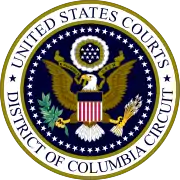United States Telecom Ass'n v. FCC (2016)
USTA v. FCC is the 2016 court case in which the Court of Appeals for the D.C. Circuit upheld the Federal Communication Commission's reclassification of broadband services as telecommunications services subject to common carrier regulation under Title II of the Communications Act of 1934. This decision was a major victory for net neutrality, the principle of non-discrimination by Internet Service Providers (ISPs) with regards to data that they carry.
| USTA v. FCC | |
|---|---|
 | |
| Court | United States Court of Appeals for the District of Columbia Circuit |
| Full case name | United States Telecom Association v. Federal Communications Commission and United States of America |
| Decided | June 14, 2016 |
| Citation(s) | DC Cir., No. 15-1063 et al. |
| Court membership | |
| Judge(s) sitting | David S. Tatel, Sri Srinivasan, Senior Circuit Judge Stephen F. Williams |
| Keywords | |
| United States Telecom Association (USTA) FCC Common carrier | |
The court upheld a set of Open Internet rules adopted by the FCC: bans on blocking, throttling, and paid prioritization of Internet traffic, a "General Conduct Rule" prohibiting broadband providers from unreasonably interfering with or unreasonably disadvantaging "(i) end users' ability to select, access, and use broadband Internet access service or the lawful Internet content, applications, services, or devices of their choice, or (ii) edge providers' ability to make lawful content, applications, services, or devices available to end users," and an enhanced set of transparency requirements.[1]
History
The 2014 D.C. Circuit court decision Verizon v. FCC vacated portions of the FCC Open Internet Order 2010 because it was determined that they could only apply to common carriers. At the time, broadband services had historically been classified as "information services," a decision made by the FCC in the early 2000s and unsuccessfully challenged in court.[2]
The FCC followed the advice of the Verizon court and sought to reclassify broadband services as "telecommunications services," giving broadband status as a "common carrier" under Title II of the Communications Act of 1934. Application of certain sections of Title II, particularly 201 and 202, prohibiting "unjust or unreasonable discrimination" by common carriers, allowed the erection of the FCC's regulatory schemes.
Ruling
The court ruled 2-1 in favor of the FCC's reclassification of broadband as a "telecommunications service," with Judges Tatel and Srinivasan in the majority and Judge Williams dissenting in part.
In its review of the appropriateness of reclassification, the court applied Chevron's two-step test to determine (1) whether the Communications Act is ambiguous with respect to the classification of broadband, and, if so, (2) whether the FCC's decision to reclassify was reasonable.
In Judge Williams' dissent, he called the FCC's reasoning "self-contradictory" and said the justification for reclassification "fails for want of reasoned decisionmaking."
Several of the telecom groups petitioned the Supreme Court for writ of certiorari following the Court of Appeals ruling, ultimately falling under the case name Berninger v. Federal Communications Commission (Docket 17-489). The petition argued that the FCC did not have the power to issue the Open Internet Order, which required a re-interpretation of the Communications Act of 1934, under the Chevron deference. On November 5, 2018, seven members of the Court denied the petition, leaving in place the Court of Appeals ruling, which established that the FCC had the ability to reclassify Internet under Title I. Chief Justice John Roberts abstained due to financial conflict, and Justice Brett Kavanaugh abstained due to his previous involvement with the case history. Three Justices, Clarence Thomas, Samuel Alito, and Neil Gorsuch had recommended accepting the petition as to order a Munsingwear vacatur, in which the Appeals Court order would have been vacated, returned to that court, and have the case rendered moot due to the more recent 2018 FCC order that reversed the Open Internet Order.[3][4]
Impact
The decision was a major victory for net neutrality, which had the support of FCC Chairman Tom Wheeler and the Obama administration.
References
- Howe, Amy (November 5, 2018). "Divided court denies review in "net neutrality" cases". SCOTUSblog. Retrieved November 5, 2018.
- Brodkin, Jon (November 5, 2018). "Supreme Court rejects industry challenge of 2015 net neutrality rules". Ars Technica. Retrieved November 5, 2018.